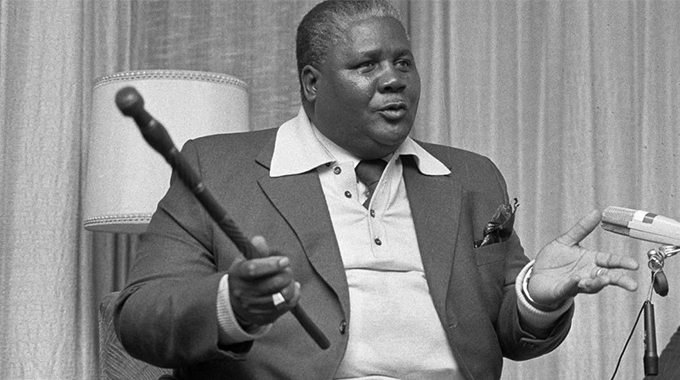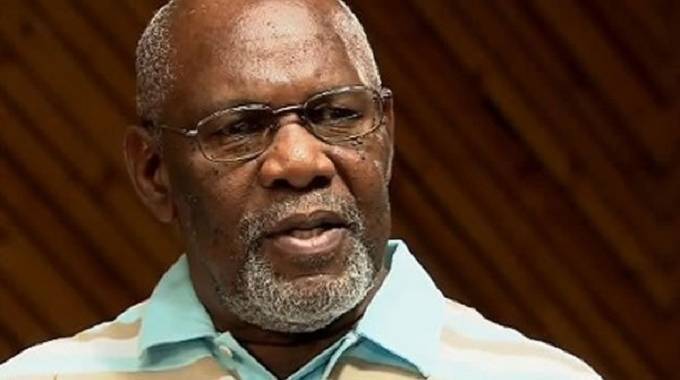Independence: Joshua Nkomo’s Green Book

Nduduzo Tshuma, Political Editor
THE late Vice President Dr Joshua Mqabuko Nkomo was passionate about the development of Zimbabwe and empowerment of all Zimbabweans through a number of initiatives around the country captured in his famous “Green Book” published in 1980.
Dr Nkomo was behind the construction of Ekusileni Medical Centre in Bulawayo that was meant to offer specialist medical care offered by international health facilities.
National hero Dr Dumiso Dabengwa recollected on Dr Nkomo’s vision that everyone owning a piece of land engages in farming on a commercial scale and peasant farming be done away with.
He said Dr Nkomo’s wish was that those experienced farmers, the whites and those who came from the native purchase areas should be able to train the peasant farmers and turn them into commercial farmers.
“This is why he went around as early as after the elections, persuading the white farmers in the country to give up their extra farms and to give in to offer to the Government some of the land where they had large farms such that they would be able to accommodate our indigenous people and be able to train them on farming,” said Dabengwa.

The late Dumiso Dabengwa
He said Nkomo also advocated for the empowerment of the black majority by making sure that they had a stake in industries and had control in production sectors.
“He (Nkomo) looked at a number of other developmental strategies which he thought needed to be gone into. In agriculture for instance this is what he went on to buy that huge farm, Nantes Ranch and his main vision was that, that should be a farm that produces pedigree cattle whose bulls would be sent around and go and develop the indigenous herds of the people all over the country,” said Dabengwa.
“There would be development of sugar fields alongside the Triangle sugar estates and be able to get a number of capable black farmers who would be given certain hectarages of land and they would be able to produce. Nuanetsi Ranch would have its own sugar mill to produce a variety of other by products such as ethanol, syrup and all other by products of sugar cane.”
Dr Dabengwa said Dr Nkomo also made strides in empowering the black majority in the mining sector.
“He looked at mining and realised that most of the mines were owned at that time by the multi-nationals. Indigenous miners did not have the qualifications and he decided to bring in people that would be prepared to train the black on modern mining methods.
“He brought in for instance the Russians who formed Development Trust of Zimbabwe (DTZ) to mine gold in the Penhalonga area and the idea was to get DTZ to use that experience that they had to open up more alluvial gold mines along our rivers which would be owned by black miners and they would be trained on exactly how to extract that gold along the river valleys.”
On coffee plantations, Dr Dabengwa said Dr Nkomo bought Vumba Coffee Estates where again DTZ started growing sugar for the purpose of producing it and broadening the coffee production to indigenous farmers around those areas along the Vumba mountains.
He said Dr Nkomo’s vision was to have coffee produced in Zimbabwe and exported to other countries.

Dr Dabengwa also made reference to the tomato canning projects initiated by Dr Nkomo in Norton, Mashonaland West and Esigodini, Matabeleland South.
“Nkomo wanted development and his idea was to develop projects in all the provinces of Zimbabwe. In Mashonaland West, he had a timber project which he wanted undertaken,” said Dabengwa.
He said Dr Nkomo also had projects he wanted to implement in Mavuradona Mountains, Mt Darwin.
“On the Kariba Dam, he had an idea of a big tourist resort that would be developed not far from the Kariba Dam wall, about 30 or so kilometres west of the Dam Wall at a point which used to be called Wafa Wafa where the Zimbabwe Military Commandos were being trained.
“He wanted to develop the hard wood timber areas in the Tsholotsho, Lupane, Nkayi areas to Gokwe for production where the timber would not be exported as raw timber but the timber would be processed into planks which would be sold for the production of finished products such as door frames, window frames, flooring tiles etcetera and that would have created jobs for all the people in that region.”
Dr Dabengwa said Dr Nkomo’s vision was inspired by his commitment to fight for the people’s aspirations and made it clear when he was approached for the leadership of the African National Congress that he wanted to work with determined people.
He said from the ANC to the time the party was banned and the emergence of the National Democratic Party and later PF Zapu, Dr Nkomo spread the gospel of unity.
“We greeted each other by the slogan that said Mntane’nhlabathi or Mwana Wevhu and that was the same throughout the country and that was the unifying greeting or salutation of all the people of Zimbabwe,” said Dr Dabengwa.
“It didn’t matter which tribe you came from, the leadership both of the NDP and that of Zapu both showed that unity of the people in the struggle for the liberation of the country as one. Yes, there were attempts by some people to come up with small parties but they didn’t go far.”
Dr Dabengwa said it was not until1963 after PF Zapu was banned and the party decided to operate as the People’s Caretaker Council that there was a split led by the late Ndabaningi Sithole to form Zanu.
He said another split occurred while Nkomo was in detention when the late George Nyandoro and James Chikerema decided to go into FROLIZI, “but that split was quickly mended after the release of Nkomo and other leaders like Josiah Chinamano and so on.”
“When they came out into Zambia, which was the external headquarter of Zapu and they continued under that unity of purpose arrangement throughout our training in Zipra, our cadres did not recognise the tribe of a person,” said Dr Dabengwa.
“This is why we had people like Rex (late General Solomon Mujuru) and others, we didn’t differentiate on the basis of tribe and that was Zapu’s position. Nkomo taught us to regard each other as Zimbabweans and nothing else and he said the identity of one’s tribe was merely in order to have different cultures which ultimately culminate into the rich culture and traditions of the country of Zimbabwe and that it should never play a role in determining the capability and ability of an individual.”











Comments